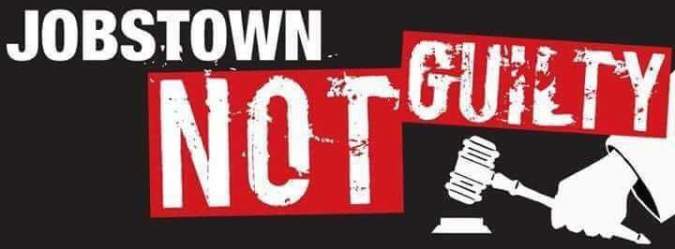
As a crowd of over two thousand gathered outside Ireland’s Central Bank in Dublin City centre, an activist from Socialist-Republican party “éirígí” climbs the platform, his name is Scott Masterson and he is charged with false imprisonment a crime in Ireland that carries a maximum penalty of ‘life’ in prison. He and 18 other people from Jobstown, a working class district of South Dublin are charged with the same offence, some are also charged with violent disorder, an offence which can result in an unlimited fine and up to 10 years in prison. Are these people part of some organised crime syndicate ? No !. Did these people inconvenience a government minister for 2 and a half hours by staging a sit down protest behind her car ? Yes !.
Joan Burton was that government minister, Burton was “Tanaiste” at the time meaning (Vice Prime Minister in the Irish language). She is a member of Ireland’s Labour Party, a party founded by Marxist and Syndicalist thinkers James Connolly, James Larkin and William O’Brien. The party has taken a significant swing to the right in recent decades similar to the Labour Party in Britain under Tony Blair. From 2011 to 2016 is was part of a coalition between themselves and the right wing, Conservative Christian party “Fine Gael”, a party which has its origins in the fascist movement in Ireland that blossomed during the 1930’s. The reason for the protest in the first place was the efforts of the ruling government in trying to introduce water charges with a view to commodifying Ireland’s water supply and eventually privatising it in the future. Ireland already pays for water through a progressive general taxation system, this new tax was basically another vicious austerity cut, another tax working class communities would have to fork up for in order to pay off Ireland’s massive bank debt created by corrupt bank officials, dodgy traders and spineless politicians.
Although the movement for the abolition of the water tax is on the road to victory, activists prosecuted for peaceful actions taken during its attempted introduction are being ruthlessly pursued through the courts. The defendants in this case and dozens of others faced heavy fines and/or jail for using their democratic right of protest. The protest in Jobstown began on 15 November 2014, word spread around the community the night before that Joan Burton was likely to attend a graduation ceremony at a local college, those graduating were disgusted and informed local activists of her possible presence. 50 people initially attended the protest which included a sit down protest behind Burtons car. The graduation wasn’t interrupted, many of the students did not want Joan Burton to present them with their award and actually joined the protest. As word of her presence spread the protest swelled to more than 500, a clear majority were women from the community.
The numbers of Gardai (police force) also swelled to over 100, with around twenty Garda vehicles. The Gardai surrounded the car and the community slow marched it out of Jobstown. The protest was spontaneous and initially unorganised, however chanting and marching was organised and negotiations took place between the police and protesters. There are videos that evidence there were democratic and open discussions by those present as to the conduct of the protest. There was a lot of anger in the community, justified given the devastating austerity cuts imposed on them. The protesters appealed to some young people who had gathered in the area not to be goaded or provoked by the police actions. The protesters actually deserve credit for making sure there was never any violence which the authorities would have used to their own benefit. Then for two weeks in February 2015 there were dawn raids with 6,8 or even 10 Garda used to arrest each individual protester including a child who was 15 years of age at the time of the protest. The adults cases were moved to the circuit criminal court with the teenagers’ case moved to the children’s courts.
In the time after the protest but before the charges were pressed the right wing media in Ireland went in to overdrive with television personalities and politicians making outrageous statements on the matter. One member of parliament from the Fine Gael party told a popular night time talk show “These were acts of violence and terrorism”, another talk show host told one of the convicted “You falsely imprisoned the Tanaiste”. It is a case of guilty until proven innocent, then on 21 October 2016 the teenager accused of false imprisonment was convicted and given a one year suspended jail sentence (his appeal is underway). After that judgement the legal team for the teen said “This verdict is a recipe for totalitarianism”. If the State is allowed to convict those who exercise their legal right to protest then pretty soon workers on strike who picket their workplace, students protesting against rising education fees, the elderly protesting against cuts in their pension, pretty soon all those who partake in such activities can and most likely will be convicted on these spurious and farcical charges.
Workers, college students, pensioners, councillors, a member of parliament, those involved local sports clubs, homeless activists, community activists, those are the people being labelled as ‘thugs’ and ‘criminals’. Anyone involved in an organisation who’s tactics to highlight their case might resort to peaceful protest are in danger of being heavily fined and incarcerated for life. #JobstownNotGuilty need your help to get the truth out about Jobstown and this miscarriage of justice. We need thousands of people to protest against it and demand all charges be dropped. If we can create broad awareness about this injustice it can positively impact the appeal of the teenager and make it more likely that a jury will acquit those accused the up coming political trials. Support #JobstownNotGuilty on Facebook, if in Ireland support us by taking part in direct action in the form of leafleting, holding stalls, putting up posters etc. Highlight this issue wherever you can whether you live in Ireland or not, remember “first they came for the Socialists”.
Gareth Ó Muireadhaigh is an activist with Socialist-Republican party éirígí. His involvement with Éirígí includes highlighting the British occupation of Ireland, protecting Ireland’s water supply against privatisation, preserving Irish cultural heritage and fighting for a fair and equal system of housing allocation. He is also an activist with Jobstown Not Guilty – a group which seek to highlight the injustice currently being meted out to Irish people who dare to protest against ruling government corruption.

